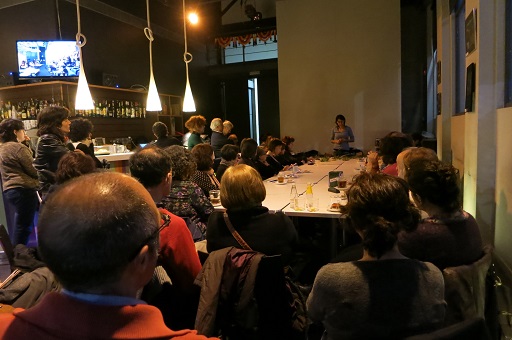Use 'Print preview' to check the number of pages and printer settings.
Print functionality varies between browsers.
Printable page generated Tuesday, 10 February 2026, 4:42 AM
Unit 1 What are Evidence Cafés
Introduction
Sometimes, problems can occur when translating research evidence or
An Evidence Café is an effective way of collecting different views on different types of evidence for a complex topic. Evidence Cafés were developed by academics at The Open University and can be characterised as a ‘means to enable
1.1 Origins of Evidence Cafés
Clough and Adams (2020) discuss how Evidence Cafés are loosely based on Café Scientifique (Dallas, 2006; Grand, 2014) which is where people meet up in an informal venue such as a café or library and exchange knowledge about a specific topic. The core principle of a Café Scientifique is that they allow an open, informal dialogue, as opposed to a lecture, in which only one person would speak on a subject (Clough et al., 2017; Clough and Adams, 2020). Whilst Café Scientifiques focus on a science topic, Evidence Cafés focus on a topic, such as research or practice, relevant to a specific group (Clough et al., 2016; Clough and Adams, 2020).
Evidence Cafés have been used across topics, domains and contexts; from policing and healthcare to sustainable development. This approach has been found to provide a new lens for collaboratively identifying and exploring different evidence and voices for complex issues. Migration is a complex issue with contrasting views from stakeholders within academic, media, public and policy contexts. Evidence Cafés have provided migration topics with an effective means of getting these different stakeholders to talk and listen to each other.
1.2 Migration-focused Evidence Cafés
Migration is a major global issue which has an important economic, social and political impact. It affects all countries of the world, though the numbers of people moving in to, and out of, a country are rarely balanced. Migration in and out of countries (
Migration is also a
There are also questions about how people acquire evidence on migration. Most of us like to think of ourselves as sensible and rational, and that we base our views on evidence, but where does that evidence come from? It may be based on anecdotes we have heard repeated often. Our opinions might also come from the news, but we know different news outlets have different political bias and levels of detail. Some people may form an opinion based on research, which also has its in-built biases and limitations. None of these sources of information are ‘better’ or ‘worse’ since they all help people form opinions, but it does mean that if we want to discuss different forms of evidence, we need to appreciate this diversity and respect the way that people gain knowledge. These positions and opinions shape the way people behave and respond to migration, which have knock-on effects. As such it is important to unpack the ‘what, who, how and why’ of understanding migration, which is what this course will help you to do.
 Activity 1.1 Write aims for an Evidence Café on migration
Activity 1.1 Write aims for an Evidence Café on migration
A) First pick a migration topic within your area of research or practice. Here are some ideas for topics to consider, but feel free to pick one of your own:
- How do you match the skills of immigrants with the needs of the labour market?
- For migrant-sending countries, how can governments ensure these migrants still contribute to the development of their home countries?
- How can you accurately measure the levels of
in-migration andout-migration ? - Why are some people in migrant-hosting countries so
anti-immigration ? - What can countries do to encourage the return of skilled and/or affluent
emigrants ? - How can we assess the contributions that migrants make to their host country?
B) Now read page 116 of Evidence Cafés and Practitioner Cafés supported by online resources (Clough et al., 2017). Consider the section on ‘Evidence Cafés – translating between research and practice’ in relation to your topic.
C) Next, for your topic, make notes in the box on some aims for using Evidence Cafés as a tool for understanding different stakeholder views on a particular migration topic.
Now that you’ve considered the value of using Evidence cafés as a process to understand different stakeholder views on migration issues in more detail, have a go at writing a definition for an Evidence Café for your migration topic.
 Activity 1.2 Write a definition for a Migration Evidence Café
Activity 1.2 Write a definition for a Migration Evidence Café
As has been detailed, Evidence Café s are designed to produce equitable
Write a definition for an Evidence Café on your migration topic that describes equitable knowledge exchange for this topic. For example, equitable knowledge exchange would be characterised by a process whereby the exchange of evidence is reciprocal and involves giving and receiving. Similarly, for the exchange to be equitable it would need to be fair and impartial with value for all.
Consider, in writing your definition, the migration topic you chose for the previous activity. It will contain different ideas that will need more effectively communicating between different
- Who are the different stakeholders relevant to this topic?
- Why does this topic need the development of more effective communication between those stakeholders?
- What methods of communication would enable the topics to be discussed equitably?
1.2 Collaboration
Collaboration is a key aspect of Evidence Cafés and migration.
 Activity 1.3 Collaborating and collecting perspectives
Activity 1.3 Collaborating and collecting perspectives
- Write a controversial proposition for your migration topic and share it with different types of migration stakeholders already identified and trusted to review this as purely a discussion point. For example, how could a specific migration initiative be implemented, how would it impact upon the current population, what would the migrants, policy makers and the press feel about this approach?
- Collate all the comments and group them according to their perspectives, types of comments, etc. You can add in analysis of what the percentage of responses were focused on.
When accessing different stakeholder opinions, it is important to consider the variety and the different roles of people you know around you. For example, most of us have access to a migrant (who is one of these stakeholders) in the general public. Policy makers can be more difficult to access but if you consider institutional policy making (as a sub-set of national policy making) we are all involved in supporting/reviewing and providing feedback on policy making within our institutions. You can always contact local departments and people to question them about their migration policies. With regard to media stakeholders, there are many social media contributors who post migration issues in open forums for discussion.
Summary
This Unit has provided an introduction to Evidence Cafés. You have been introduced to the process for an Evidence Café and learned how they can be an effective way of collecting diverse views and different types of evidence for a complex issue. In particular this Unit has reviewed the background to Evidence Cafés, how they were developed as a
Unit learning outcomes:
- This Unit has introduced and developed your understanding of Evidence Cafés as a process for knowledge exchange with migration issues.
- Using the Evidence Café process has helped you critically analyse the role of knowledge exchange processes in migration issues and how stakeholder perspectives are associated with a particular issue and through an Evidence Café how to support communication and collaboration with those stakeholders.
- You now have an understanding of different Evidence Café processes as well as how these can be related to the context of migration knowledge exchange.
- You have been introduced to how you can use Evidence Cafés as a process to construct and communicate with migration stakeholders.
- You have practically reflected upon applying Evidence Cafés within the migration context. This has required developing an understanding of collaborating with diverse migration stakeholders and how to collect their different perspectives as part of an Evidence Café process.
In Unit 2 Migration debate you will watch a video which involves different stakeholders involved in the topic of migration discussing diverse pieces of evidence and hear their perspectives on this broad topic.


